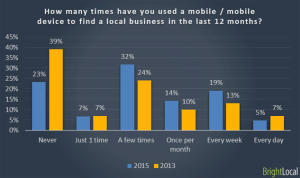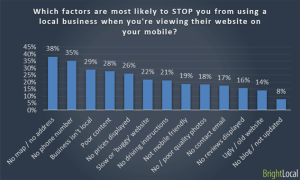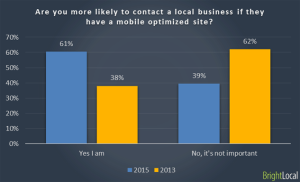
How Important Is Mobile to the Consumer?
Key Things to Remember:
- 38% have searched on mobile at least once per month for a local business
- 61% are more likely to contact a local business with a mobile site
With the increase in mobile usage, if you want to attract customers to your business, the decision of whether or not to have a mobile site is no longer an option.
Google’s algorithm change last month hasn’t had the horrific impact predicted worthy of its ‘Mobilegeddon’ nickname. It’s important to remember that mobile friendliness is just one of many variables that Google considers, but it’s clear that going forward, user-experience on mobile devices will have a greater impact.
Customer Lobby wanted to discover how consumer usage of mobile devices to find local businesses has changed. They ran a survey on this topic in 2013 and pushed the same survey to 900 members of their US consumer panel in April 2015. We pulled out three key tidbits of information from this survey that local businesses need to know.
How many times have you used a mobile device to find a local business in the last 12 months?
Key Findings:
- 23% have not used a mobile device to search for a local business (vs. 39% in 2013)
- 70% have searched at multiple times in the last 12 months (vs. 54% in 2013)
- 38% have searched at least one time in a month (vs. 30% in 2013)
Analysis:
The standout statistic is the drop in the number of users who have ‘Never’ used a mobile to find a local business. 23% said they never had compared to 39% in 2013. This 16% decrease shows that a lot more consumers are using their mobile devices to find local businesses than in 2013. In addition, more consumers are searching on their mobiles on a more regular basis. 38% have searched at least one time per month (weekly or daily), compared to 30% in 2013. And 70% have searched multiple times this year vs 54% in 2013.
This result can be tracked to a multitude of factors. The penetration of smart phones, and our reliance on them, is a huge factor. Also, improvements in both apps and the browsing experience have made the process easier and more like desktop search. To some extent, the increase in small and medium businesses having mobile websites has played its part in raising consumer expectations.
The SMB Internet Marketing Survey 2014 reported that 66% of small and medium businesses do have a mobile optimized website, versus 59% in 2013.
The importance of having a fully mobile optimized site cannot be underestimated.
Which factors are most likely to STOP you from using a local business when you’re viewing their website on your mobile?
Key Findings:
- 38% of consumers are put off by having no map or address displayed
- 35% of consumers are put off by having no phone number displayed
- 29% of consumers are put off if the business isn’t local to them
Analysis:
Similar to the previous chart, it is clear that consumers on a mobile device are looking for information that helps them contact a business. If the business doesn’t meet these requirements, then it is likely that the consumer will get frustrated and you could lose them.
Looking back again at the 2014 research into desktop usage, we see that for desktop searchers, the same items like having no phone number, no price list and poor content were major ‘turnoffs’ for local customers back then.
Content is perhaps more important for desktop searchers, but still, 28% of mobile browsers suggested it was a make-or-break feature. Make sure there’s quality content available on your website, but also ensure that mobile visitors can quickly find the contact & location information that they require.
Are you more likely to contact a local business if they have a mobile optimized site?
Key Findings:
- 61% are more likely to contact a local business if they have a mobile-optimized site
- 38% do not believe a mobile site is important for a local business
Analysis:
If a local business has a mobile-optimized website, they are not only more likely to be found by mobile searchers, but they are more likely to convert those consumers that actually visit their website.
Google’s algorithm change has ensured that in the long term, only those businesses that are ‘mobile friendly’ will get found in Google search results. And Bing is following suit with a similar update. Because of consumer behavior, even direct visitors or consumers using alternative Search Engines will be more likely to contact that business if it is optimized for a mobile device.
Consumers no longer give smaller local businesses a ‘free pass’ on their website quality. The expectations are growing, and if a business doesn’t adapt for mobile devices, they will inevitably lose out to competitors that do.



